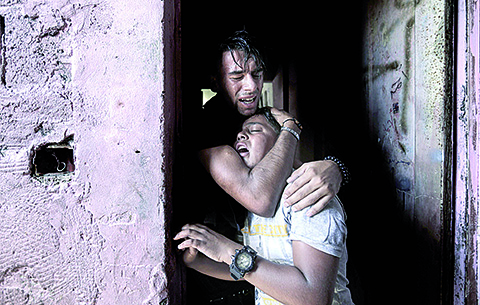
GAZA: The brothers of Sabri Ahmed Abu Khader, mourn during his funeral in Gaza City yesterday. - AFP
GENEVA: Britain yesterday urged the UN Human Rights Council to reform its treatment of Israel, joining the United States in demanding an end to the body's alleged bias against the Jewish State. Addressing the opening of the 38th council session, British foreign secretary Boris Johnson criticized the council's controversial Agenda Item 7, a permanent fixture on the schedule exclusively devoted to discussing rights abuses in the Palestinian Territories.
"We share the view that the dedicated Agenda Item 7 focused solely on Israel and the Occupied Palestinian Territories is disproportionate and damaging to the cause of peace, and unless things change we shall vote next year against all resolutions introduced under Item 7," Johnson said. Israel is the only country with a dedicated council item. Washington, some European countries and Australia have sided with Israel in condemning Item 7 as prejudiced, noting that countries with arguably worse rights records in recent years, like Syria are spared such intense scrutiny.
While previous US administrations have criticized Item 7, President Donald Trump's government has raised the prospect of withdrawing from the council unless it is scrapped. Johnson noted however that the council had an important role to play in "the Israeli-Palestinian conflict under the right agenda item." Each council session includes an agenda item on so-called country specific situations, known as Agenda Item 4, where debates on the crises in Syria, Burundi and others typically take place.
Palestinian killed
Meanwhile, a Palestinian was killed yesterday when a part of Israel's fortifications on the Gaza border blew up as he tampered with it, the Israeli military said. The 24-year-old man's death in northern Gaza followed a more than two-month surge in tensions along the frontier, where Israeli troops have killed at least 125 Palestinians during sometimes violent mass demonstrations. Residents said the man killed in the blast was among a group of Palestinians who approached the border fence, drawing fire from soldiers on the other side. An Israeli military statement described them as "five terrorists who tried to sabotage the (border) security infrastructure".
"The security infrastructure exploded, and as a result of that, there were casualties among the terrorists," it said. Military spokesmen declined to elaborate on the blast or say whether Israel had employed a new counter-measure against incursions. Since its last war with Gaza's dominant Hamas Islamists in 2014, Israel has stepped up efforts to prevent cross-border attacks, improving rocket interceptors and investing in technologies for detecting and destroying guerrilla tunnels.
Faced with international censure over its use of live fire in the fence protests, Israel says troops have been holding off border breaches and responding to gunmen who tried to use civilians as cover for attacks on them. There have been no serious Israeli casualties in the confrontations since the so-called "Great March of Return" was launched on March 30 to press for what Palestinians see as their right to lands lost to Israel during the 1948 war of its founding.
Fire-starting kites
But incendiary materials flown in from Gaza by kites or helium balloons have destroyed swathes of farmland and forests, and killed wildlife. In what the military described as a response to the blazes, Israeli jets struck nine Hamas targets in northern Gaza on Monday. Sirens sounded in outlying Israeli areas and the military said three rockets had been launched towards Israeli territory but one fell short in Gaza. "These are terrorist acts that endanger Israeli residents living in southern Israel and damage extensive areas in Israeli territory," a military statement said of the kites and balloons.
There were no casualties in the air strikes or rocket launches. Israel has drafted in civilian drone enthusiasts as army reservists, instructing them to fly their remote-controlled aircraft into the kites, an Israeli general said, but an effective means to stop the kites has yet to be found. Around two million people live in Gaza, most of them the descendants of refugees from what is now Israel. The territory has been controlled by Hamas for more than a decade, during which it has fought three wars against Israel. Israel and Egypt maintain a blockade of the strip, citing security reasons, which has caused an economic crisis and collapse in living standards there over the past decade. - Agencies










